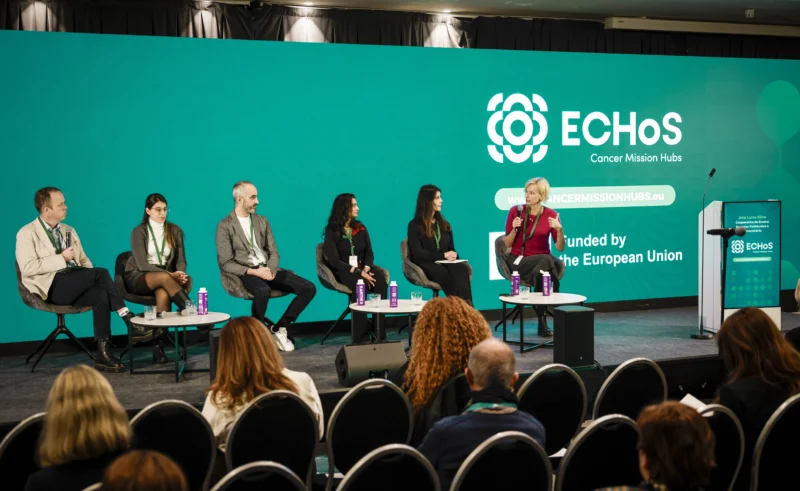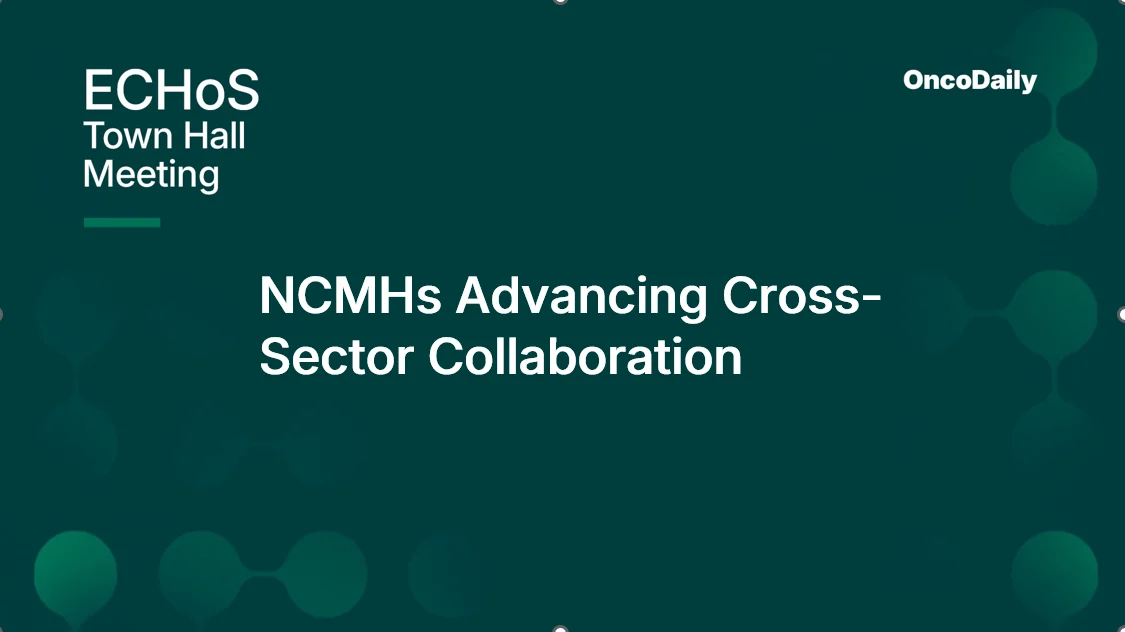At the ECHoS Town Hall Meeting, the session “Collaborative Actions Promoted by NCMHs” brought together leaders of national cancer mission hubs and hub-like structures from across Europe. Moderated by William Gallagher (University College Dublin & All-Island Cancer Research Institute), the session explored how mission-driven collaboration, multi-stakeholder engagement, and shared ownership of problems are accelerating progress in cancer control at national and regional levels.

The panel featured Carla van Laer (Netherlands Cancer Collective), Marine Jeanmougin (Oslo Cancer Cluster, Norway), Ivaylo Petrov (Bulgarian Joint Cancer Network), Dheepa Rajan (European Observatory on Health Systems and Policies), and Ana Luísa Silva (Portuguese National Cancer Hub). Each speaker shared concrete examples of how collaborative structures are reshaping cancer policy, innovation, and patient empowerment across Europe.
Norway: Public-Private Collaboration Built on Trust
Norway’s experience shows that strong cross-sector collaboration was already in place before the hub, thanks to a long-standing consortium linking hospitals, universities, regulators, patient groups, and industry around precision cancer medicine. The hub now builds on this foundation through a structure that includes a secretariat, a strategic group, a broad stakeholder group, and an annual high-level forum. Jeanmougin pointed to several concrete examples of collaboration including:
- Cancer Cross-Links, a long-running event co-created with BMS
- Industry mentorship programs for young researchers
- Joint strategy workshops at ESMO, including one focused on ATMPs
- Mobilizing SMEs and industry partners to participate in EU Cancer Mission calls
A defining feature of the Norwegian approach, she said, is the cultural norm of trust and openness across sectors — a “key ingredient” enabling the hub to work effectively with private partners.
Bulgaria: A Next-Generation Approach to Systemic Change
National cancer registry and a healthcare system still developing its digital foundations. The discussion underscored that digitalisation and AI can only advance when the underlying human processes—communication, collaboration, and shared governance—are strong. Recent progress, such as the National Cancer Control Plan and the new legal basis for telemedicine, marks an important shift, though significant implementation gaps remain.
A major focus of the Bulgarian hub is shifting from “siloed mindsets” to coordinated action. Petrov described this as a “next-generation approach,” driven by professionals, civil society, and citizens committed to building a modern, patient-centred cancer system. The hub is now shaping screening programmes, supporting national registry development, and helping hospitals move toward comprehensive cancer centre standards—work that increasingly involves ministries, municipalities, universities, and political groups in unprecedented national coordination.
Policy Dialogues: Bringing Evidence and People Together
Policy Dialogues were introduced as a structured tool widely used across mission hubs. Unlike workshops or presentations, these dialogues bring together a small group of 30–40 diverse stakeholders to examine a specific question, guided by curated evidence and a facilitated discussion.
The purpose is not just consensus but commitment — enabling systems stuck in circular discussions to move toward a next step or decision point. Preparation is critical: defining the exact issue, identifying the right stakeholders, and framing the evidence all shape the success of the dialogue.
Rajan emphasized that dialogues must be safe spaces, operate under Chatham House rules, and be tightly facilitated to prevent domination by any single group. While not a universal solution, they are a powerful tool for mission hubs seeking to influence policy windows and build shared ownership of next steps.
Portugal: Empowering Patients Through Health Information
Closing the session, the work of Portugal’s National Cancer Hub Health Information Group was highlighted — a multidisciplinary team committed to improving health literacy for people with cancer.
To ensure their work addressed real needs, the team conducted focus groups with patients, caregivers, and professionals, identifying three major areas of uncertainty after diagnosis: understanding cancer, navigating treatment pathways, and knowing one’s rights and practical supports.
This led to the creation of the Resource Guide for People with Cancer and Their Caregivers, an e-book compiling more than 350 curated, verified resources from hospitals, national institutions, and patient organisations. Written in plain language and structured around frequently asked questions, the guide helps users find reliable answers quickly — especially important in a country with low digital literacy.
More than 60 volunteers now contribute to this collective project, which has surpassed 3,000 downloads. For Silva, the measure of success is simple: “People say, I read it and I understood it.”
A Shared Message: Collaboration Is the Accelerator
A clear theme ran through the session: hubs succeed not by imposing solutions but by creating shared spaces where diverse stakeholders can think differently and build actionable paths together. Across Europe, acceleration teams, public-private partnerships, policy dialogues, and health literacy initiatives are proving that even small collaborative structures can drive real system change.
The discussion underscored the power of mission-driven, multi-stakeholder action to advance national cancer agendas and strengthen Europe’s collective response to cancer.
For more information click here.


